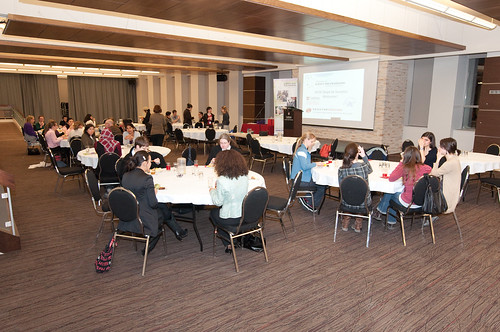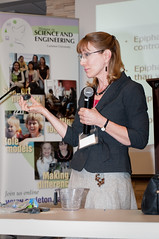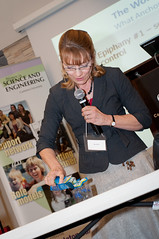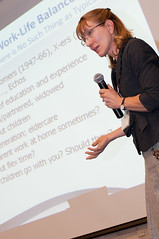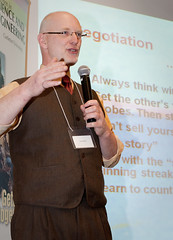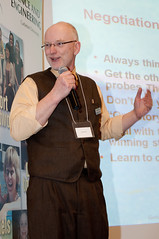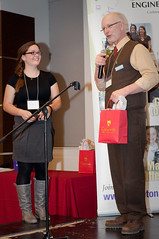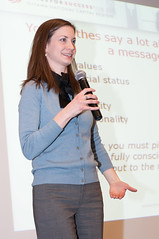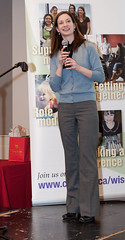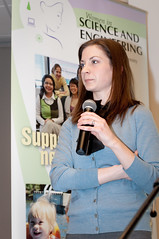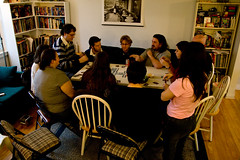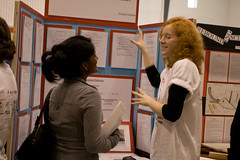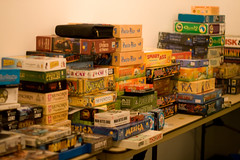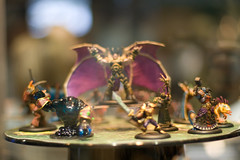Cross-posted from my personal blog
It's the time of year where people evaluate their lives and look back over the previous year, and with that in mind, I'm going to bring you a not-about-new-years post about gaming and science to mess up your reflective blog feeds. If it helps, it's a
reflective post about gaming and science.
But they were pretty good at figuring out how to defeat the bosses. One day she found out why. A group of them were building Excel spreadsheets into which they'd dump all the information they'd gathered about how each boss behaved: What potions affected it, what attacks it would use, with what damage, and when. Then they'd develop a mathematical model to explain how the boss worked -- and to predict how to beat it.
Often, the first model wouldn't work very well, so the group would argue about how to strengthen it. Some would offer up new data they'd collected, and suggest tweaks to the model. "They'd be sitting around arguing about what model was the best, which was most predictive," Steinkuehler recalls.
That's when it hit her: The kids were practicing science.
You can read the rest here: "
How Videogames Blind Us With Science"
My gut reaction to this article (which is actually several years old, but new to me) is "well, duh." When we neighbourhood kids got interested in a new game, we might have skipped the spreadsheets, but we definitely would resort to exploring in a structured manner if we got stuck. We'd compare notes, share ways to beat challenges, and sometimes try to improve upon the techniques (only sometimes because many games weren't really flexible enough to have multiple solutions).
I guess I'm missing some of that collaborative effort nowadays in that I can always just look up game faqs if I got stuck... but because I like people and because my brother and I grew up with a community of friends to ask for help rather than a community of internet FAQs and wikis, sometimes I ask people instead of the internet because it's more fun. And goodness knows, my sister and I have been comparing Super Scribblenauts solutions all week. ("You solved that with a mosquito? Why didn't I think of that? I made an undead blood-sucking harpy!")
I grew up in a household with two scientist parents, so not only was experimentation a daily fact of life, but the word "hypothesis" came into our lexicons fairly early on. I've grown up looking through life through a very scientific lens as a result (also a very biology-oriented filter, which accounts for my very ecologically-oriented view of computer security, but that's another story). My parents were constantly frustrated with my early science education, and I'll bet they'll find this next paragraph pretty familiar:
One of the reasons kids get bored by science is that too many teachers present it as a fusty collection of facts for memorization. This is precisely wrong. Science isn't about facts. It's about the quest for facts -- the scientific method, the process by which we hash through confusing thickets of ignorance. It's dynamic, argumentative, collaborative, competitive, filled with flashes of crazy excitement and hours of drudgework, and driven by ego: Our desire to be the one who figures it out, at least for now. It's dramatic and nutty and fun.
I actually didn't go into proper experimental science because I'm terrible at drudgework... easily bored, and not very good at the rigour required, and used to be prone to spending more time avoiding a boring task than doing it (at least until I learned perl and other automation tools). (My sister became the scientist, since as she likes to put it "I excel at boring tasks" -- but it's really that she's organized, precise, and takes a lot of joy in implementing a consistent system. I went into security because I like breaking things; she does regulatory work because she likes making things consistent. Sometimes, we have noticeable overlap in our skills and jobs, other times not so much.) I went into non-experimental computer science, though, because I love the collaboration and the competition and the ideas and the learning. But I hadn't really thought about my unsuitability for experimental science as being related to the reason I don't go into massively multiplayer online games hoping to be the first on the server to down some big raid boss.
But I
do science with every new game I play, as do my friends. When we picked up Dominion (a card game which includes a variety of types of cards, and you chose some subset of them to use for any given ame), we'd play a few rounds and argue strategies and then try to implement them in different ways to see how they played against each other, or changed the groupings of cards to see how it changed the strategy. I guess maybe some people play these things closer to their chests and won't share with their friends, but we toss in a few new cards and suggest to play off each other because that's part of what makes it fun for us.
So now I'm thinking... what to games do to make sure they stay in that fun exploratory part of science and avoid the drudgework? And the answer of course is that they don't really avoid the drudgework. Earlier games had you wandering around "grinding" to get your character high enough level to take on the big boss... Let me tell you, playing final fantasy III on my DS was at times significantly
less fun than "grinding" courses for my PhD has been. But they've done a lot to provide fun while you do that. One relatively modern invention has been letting players level their guild (I first saw this in Dungeons and Dragons online, but I expect the idea's been around longer... it's only recently gone into World of Warcraft) and we were shocked to discover that doing the same darned quest for the 4th time wasn't nearly as bad when there was a chance that we'd get to guild level 2 that night. Achievements, leaderboards, crafting, even ridiculous pets... there's a lot of stuff tangential to the end game that makes getting there more fun.
How do we put that joy back into science education? I'm not talking about gamification in the modern sense; I'm talking about those great teachers we managed to get. My chemistry teacher (and many others) did it through fun demo science: he'd do experiments we weren't ready to do on our own and had us all on the edge of our seats waiting for the final explosion... or sometimes the final terrible pun. Even his "you have to be careful in the science lab" talk at the beginning of the year included opening a book that promptly burst into flame. Each lecture was filled with discovery, even when it was tangential to the point. (The lecture on molar concentrations involved terrible puns involving moles and mole-asses.) And of course there's actually *doing* the hands-on experiments ourselves, which can be incredibly fun when they're well-chosen and interesting.
I guess in hindsight, we put the joy into science by enhancing the opportunities to learn and discover and accomplish... very similarly to the way we put the joy back into gaming.
Perhaps it's not really that surprising that there are a large number of scientist-types who also enjoy gaming, and that gamers will employ some science to tackle the challenges within a game.
And finally, I'll leave you with the last lines of the article, which made me smile:
At one point, Steinkuehler met up with one of the kids who'd built the Excel model to crack the boss. "Do you realize that what you're doing is the essence of science?" she asked.
He smiled at her. "Dude, I'm not doing science," he replied. "I'm just cheating the game!"
